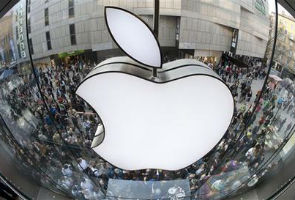- Home
- Tablets
- Tablets News
- Apple's job creation data spurs an economic debate
Apple's job creation data spurs an economic debate
By Nick Wingfield, New York Times | Updated: 5 June 2012 17:23 IST

Click Here to Add Gadgets360 As A Trusted Source

Advertisement
Apple has made its first attempt to quantify how many American jobs can be credited to the sale of its iPads and other products, a group that includes the Apple engineers who design the devices and the drivers who deliver them - even the people who build the trucks that get them there.
On Friday, the company published the results of a study it commissioned saying that it had "created or supported" 514,000 American jobs. The study is an effort to show that Apple's benefit to the American job market goes far beyond the 47,000 people it directly employs here.
Apple, based in Cupertino, Calif., released the study on its Web site but declined to say why it published the results.
The company's employment practices have come under closer examination. Apple and other high-tech companies, including Internet companies, employ relatively few people compared with other stalwarts of American business, like General Motors and General Electric in their heyday.
Apple, which is now the world's most valuable company, has created more jobs overseas, approximately 700,000 through a network of suppliers that make iPhones, iPads and other products.
The accuracy of the Apple jobs calculation in the United States may well be debated among economists for years. "Apple has a big effect, and big is about as precise as I can make it," said Gary P. Pisano, a professor of business administration at Harvard Business School. "It's hard to say the exact size."
David Autor, an economics professor at the Massachusetts Institute of Technology, said via e-mail that the "entire business of claiming 'direct and indirect' job creation is disreputable" because most of the workers Apple is taking credit for would have been employed elsewhere in the company's absence.
"But of course, they might not have been as well paid or gratified with their work," Mr. Autor said. "We'll never know."
Mr. Autor also said that Apple should not be held accountable for employment problems in the United States. "Generating the conditions that give rise to high rates of employment and wage growth is the domain of policy makers, not individual companies," he said.
A number of companies, including Microsoft, have commissioned similar research aiming to tally up such indirect employment, by suppliers and other partners. The use of "job multipliers" has become common practice, sometimes by businesses lobbying for tax breaks from local and state governments.
But the calculations of such multipliers are often fiercely debated both in economic and political terms. For instance, the Congressional Budget Office, which calculated the impact of the 2009 federal stimulus on jobs, has set estimates that vary between as few as 1.6 million jobs and as many as 8.4 million jobs.
Peter Cappelli, a professor of management at the Wharton School at the University of Pennsylvania, says companies often have a stronger case when quantifying their effects on a regional economy, rather than on the entire national economy. It does matter to a state, for example, whether a big business is there, though it might not matter nationally if the business moves to a different state, he said.
The Analysis Group, the consulting firm Apple hired, concluded that 257,000 jobs were in companies that work directly with Apple, including employees in Kentucky and New York at Corning, a company that creates glass for the iPhone, and people at a Samsung plant in Texas.
The Analysis Group arrived at that figure by analyzing how much Apple spent on goods and services in the United States in 2011 and applying that information to a formula developed by the federal government's Bureau of Economic Analysis called an "employment multiplier." The group used this multiplier to calculate direct and indirect employment figures from Apple's spending, though it omitted any jobs created through spending by those people on, say, nannies, vacation homes or restaurants.
Among the outside jobs Apple said it helped support were the delivery services that bring packages of Apple devices to its retail stores and directly to customers' homes. Norman Black, a spokesman for United Parcel Service, said the company estimated that for every 40 new packages a day transported through its system, the company hired one more person. He declined to say how many packages Apple shipped through U.P.S. and, therefore, how many jobs could be credited to the company.
"They rely on us for a lot of shipping," Mr. Black said. "There's no question that as they roll out and launch products, that's creating new jobs in the U.S."
Apple's study said the company also supported an additional 210,000 jobs among companies creating apps for Apple devices like the iPhone and iPad. The study based that figure on the 466,000 app-related jobs that TechNet, a high-tech lobbying group, recently estimated existed in the United States. Apple's study estimated that 45 percent of that figure could be credited to development of software for Apple devices, based on an analysis of online job listings.
While several economists and employment experts agree that Apple has an economic impact that goes beyond the people it directly employs, they said it was difficult to conclude from Apple's study what the company's benefit is to the overall jobs market. "They certainly have a big economic impact, as does every other firm," Mr. Cappelli said. "If you say, 'If there had been no Apple, those people would not have jobs,' that's not true."
As an example, Mr. Cappelli said that if there were no iPad, the $500 an Apple customer would have spent on the device most likely would not have been put into savings, but rather spent on some other product or service. That impact could have been more or less than Apple's. Apple is, however, an innovative company that created a market for tablets and radically increased demand for smartphones.
On Friday, the company published the results of a study it commissioned saying that it had "created or supported" 514,000 American jobs. The study is an effort to show that Apple's benefit to the American job market goes far beyond the 47,000 people it directly employs here.
Apple, based in Cupertino, Calif., released the study on its Web site but declined to say why it published the results.
The company's employment practices have come under closer examination. Apple and other high-tech companies, including Internet companies, employ relatively few people compared with other stalwarts of American business, like General Motors and General Electric in their heyday.
Apple, which is now the world's most valuable company, has created more jobs overseas, approximately 700,000 through a network of suppliers that make iPhones, iPads and other products.
The accuracy of the Apple jobs calculation in the United States may well be debated among economists for years. "Apple has a big effect, and big is about as precise as I can make it," said Gary P. Pisano, a professor of business administration at Harvard Business School. "It's hard to say the exact size."
David Autor, an economics professor at the Massachusetts Institute of Technology, said via e-mail that the "entire business of claiming 'direct and indirect' job creation is disreputable" because most of the workers Apple is taking credit for would have been employed elsewhere in the company's absence.
"But of course, they might not have been as well paid or gratified with their work," Mr. Autor said. "We'll never know."
Mr. Autor also said that Apple should not be held accountable for employment problems in the United States. "Generating the conditions that give rise to high rates of employment and wage growth is the domain of policy makers, not individual companies," he said.
A number of companies, including Microsoft, have commissioned similar research aiming to tally up such indirect employment, by suppliers and other partners. The use of "job multipliers" has become common practice, sometimes by businesses lobbying for tax breaks from local and state governments.
But the calculations of such multipliers are often fiercely debated both in economic and political terms. For instance, the Congressional Budget Office, which calculated the impact of the 2009 federal stimulus on jobs, has set estimates that vary between as few as 1.6 million jobs and as many as 8.4 million jobs.
Peter Cappelli, a professor of management at the Wharton School at the University of Pennsylvania, says companies often have a stronger case when quantifying their effects on a regional economy, rather than on the entire national economy. It does matter to a state, for example, whether a big business is there, though it might not matter nationally if the business moves to a different state, he said.
The Analysis Group, the consulting firm Apple hired, concluded that 257,000 jobs were in companies that work directly with Apple, including employees in Kentucky and New York at Corning, a company that creates glass for the iPhone, and people at a Samsung plant in Texas.
The Analysis Group arrived at that figure by analyzing how much Apple spent on goods and services in the United States in 2011 and applying that information to a formula developed by the federal government's Bureau of Economic Analysis called an "employment multiplier." The group used this multiplier to calculate direct and indirect employment figures from Apple's spending, though it omitted any jobs created through spending by those people on, say, nannies, vacation homes or restaurants.
Among the outside jobs Apple said it helped support were the delivery services that bring packages of Apple devices to its retail stores and directly to customers' homes. Norman Black, a spokesman for United Parcel Service, said the company estimated that for every 40 new packages a day transported through its system, the company hired one more person. He declined to say how many packages Apple shipped through U.P.S. and, therefore, how many jobs could be credited to the company.
"They rely on us for a lot of shipping," Mr. Black said. "There's no question that as they roll out and launch products, that's creating new jobs in the U.S."
Apple's study said the company also supported an additional 210,000 jobs among companies creating apps for Apple devices like the iPhone and iPad. The study based that figure on the 466,000 app-related jobs that TechNet, a high-tech lobbying group, recently estimated existed in the United States. Apple's study estimated that 45 percent of that figure could be credited to development of software for Apple devices, based on an analysis of online job listings.
While several economists and employment experts agree that Apple has an economic impact that goes beyond the people it directly employs, they said it was difficult to conclude from Apple's study what the company's benefit is to the overall jobs market. "They certainly have a big economic impact, as does every other firm," Mr. Cappelli said. "If you say, 'If there had been no Apple, those people would not have jobs,' that's not true."
As an example, Mr. Cappelli said that if there were no iPad, the $500 an Apple customer would have spent on the device most likely would not have been put into savings, but rather spent on some other product or service. That impact could have been more or less than Apple's. Apple is, however, an innovative company that created a market for tablets and radically increased demand for smartphones.
Comments
Get your daily dose of tech news, reviews, and insights, in under 80 characters on Gadgets 360 Turbo. Connect with fellow tech lovers on our Forum. Follow us on X, Facebook, WhatsApp, Threads and Google News for instant updates. Catch all the action on our YouTube channel.
Related Stories
Popular on Gadgets
- Samsung Galaxy Unpacked 2026
- iPhone 17 Pro Max
- ChatGPT
- iOS 26
- Laptop Under 50000
- Smartwatch Under 10000
- Apple Vision Pro
- Oneplus 12
- OnePlus Nord CE 3 Lite 5G
- iPhone 13
- Xiaomi 14 Pro
- Oppo Find N3
- Tecno Spark Go (2023)
- Realme V30
- Best Phones Under 25000
- Samsung Galaxy S24 Series
- Cryptocurrency
- iQoo 12
- Samsung Galaxy S24 Ultra
- Giottus
- Samsung Galaxy Z Flip 5
- Apple 'Scary Fast'
- Housefull 5
- GoPro Hero 12 Black Review
- Invincible Season 2
- JioGlass
- HD Ready TV
- Latest Mobile Phones
- Compare Phones
Latest Gadgets
- Tecno Pova Curve 2 5G
- Lava Yuva Star 3
- Honor X6d
- OPPO K14x 5G
- Samsung Galaxy F70e 5G
- iQOO 15 Ultra
- OPPO A6v 5G
- OPPO A6i+ 5G
- Asus Vivobook 16 (M1605NAQ)
- Asus Vivobook 15 (2026)
- Brave Ark 2-in-1
- Black Shark Gaming Tablet
- boAt Chrome Iris
- HMD Watch P1
- Haier H5E Series
- Acerpure Nitro Z Series 100-inch QLED TV
- Asus ROG Ally
- Nintendo Switch Lite
- Haier 1.6 Ton 5 Star Inverter Split AC (HSU19G-MZAID5BN-INV)
- Haier 1.6 Ton 5 Star Inverter Split AC (HSU19G-MZAIM5BN-INV)
© Copyright Red Pixels Ventures Limited 2026. All rights reserved.






![[Partner Content] OPPO Reno15 Series: AI Portrait Camera, Popout and First Compact Reno](https://www.gadgets360.com/static/mobile/images/spacer.png)









